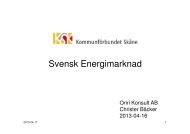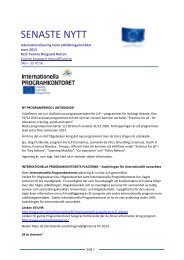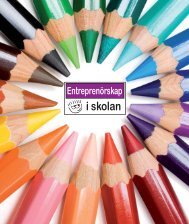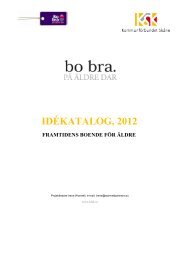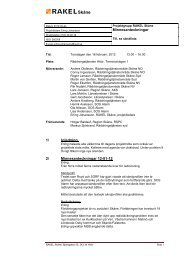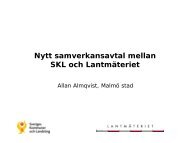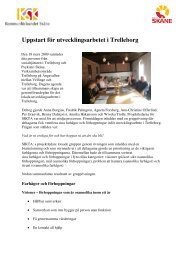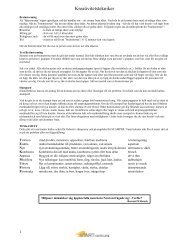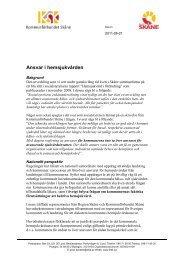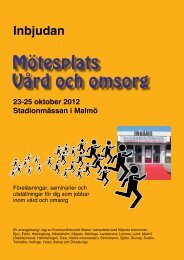- Page 3: DU KAN OM DU VILL
- Page 6 and 7: CIP Cataloguing in PublicationBacks
- Page 10 and 11: Att vara alltför djupt och totalt
- Page 12 and 13: 4 Resultat 1914.1 Bakgrundsfaktorer
- Page 14 and 15: TabellförteckningTabell 1. Sammanf
- Page 16 and 17: Enligt finländska utbildningsmyndi
- Page 18 and 19: läroplansarbetet. De hade själva
- Page 20 and 21: år kommer att förlora en miljard
- Page 22 and 23: inom den grundläggande utbildninge
- Page 24 and 25: nivå, karaktärsdrag som konstitue
- Page 26 and 27: lig utveckling och inre kvalifikati
- Page 28 and 29: hur temaområdet uppfattas och för
- Page 30 and 31: material och uppläggning av unders
- Page 32 and 33: knyts till en nationell och kollekt
- Page 34 and 35: eller -rikedom. Men yrittäjyys anv
- Page 36 and 37: kring företagsamhetsfostran inte i
- Page 38 and 39: att arbeta målmedvetet. Inre före
- Page 40 and 41: 2.1.3 Företagsamhet - ett multidis
- Page 42 and 43: tod där elever lär sig företagsa
- Page 44 and 45: 2.2 Ekonomiska spårFostran till f
- Page 46 and 47: nadsekonomi utan statligt stöd och
- Page 48 and 49: En av von Mises studenter, Kirzner,
- Page 50 and 51: BeslutsfattareKoordinatorSayRisktag
- Page 52 and 53: Pinchot (1986, s. 6) särskiljde in
- Page 54 and 55: Tiller och Tiller (2003, s 123) ans
- Page 56 and 57: Undervisningsministeriet i Finland
- Page 58 and 59:
I likhet med UF-konceptet profilera
- Page 60 and 61:
2.3.1 Samhällspolitiskt intresse f
- Page 62 and 63:
Koiranen och Peltonen (1995) hävda
- Page 64 and 65:
unga åldersklassen skall ges yrkes
- Page 66 and 67:
Enligt Hargreaves (1999, s. 17 f) h
- Page 68 and 69:
För att sporra lärare i deras arb
- Page 70 and 71:
De utbildningspolitiska besluten gr
- Page 72 and 73:
och politiska. Investering i det hu
- Page 74 and 75:
Lärarna ansvarar för att de utbil
- Page 76 and 77:
värden, som är själva förutsät
- Page 78 and 79:
nad av den tidigare (förmoderna) y
- Page 80 and 81:
Flera uttolkare av tiden betonar de
- Page 82 and 83:
ten blir i stället ett botemedel m
- Page 84 and 85:
skapsinhämtning i en individualise
- Page 86 and 87:
Diskussionens syfte är att försö
- Page 88 and 89:
Även Hyrsky (2001, s. 117) visar i
- Page 90 and 91:
2.5 Psykologiska spårMedan jag i d
- Page 92 and 93:
McClellands forskningsresultat visa
- Page 94 and 95:
2.5.2 Karaktärsdrag, tänkesätt o
- Page 96 and 97:
troende, förmåga att vara instäl
- Page 98 and 99:
gång i affärslivet. Vid skapandet
- Page 100 and 101:
Vos, 1994, s. 272 f) sammanfattar o
- Page 102 and 103:
tagsamhet är ju att visionerna fak
- Page 104 and 105:
enligt Delmar (1996, s. 13, 199) pr
- Page 106 and 107:
Jag inleder med att diskutera bildn
- Page 108 and 109:
från detta ideal där eleven place
- Page 110 and 111:
eflektion och psykosocial mognad, s
- Page 112 and 113:
lir en av företagsamhetsfostrans u
- Page 114 and 115:
Detta innovativa lärande (Kroksmar
- Page 116 and 117:
dividuella, personliga utvecklingen
- Page 118 and 119:
ildningsideal där sådana faktorer
- Page 120 and 121:
företagaranda och att dessutom sti
- Page 122 and 123:
Enligt definitioner på fostran til
- Page 124 and 125:
aktären av ”starta-eget-kurser
- Page 126 and 127:
2.6.3 Företagsamhetsfostran i skol
- Page 128 and 129:
För att applicera de tankegångar
- Page 130 and 131:
för lärande. Utifrån den här sy
- Page 132 and 133:
Till skillnad från den angloamerik
- Page 134 and 135:
skapa ett företagsamt förhållnin
- Page 136 and 137:
eller förstår innebörden i att s
- Page 138 and 139:
Inom en emancipatorisk diskurs acce
- Page 140 and 141:
na pådyvlad last. När Ikonen (200
- Page 142 and 143:
Tabell 1. Innebörden i företagsam
- Page 144 and 145:
2.7 KonklusionInom varje forsknings
- Page 146 and 147:
Ett humanistiskt bildningsideal är
- Page 148 and 149:
akta begrepp, eftersom vi uppfattar
- Page 150 and 151:
Forskningsfrågorna och den empiris
- Page 152 and 153:
levda insikter som inte kan nås l
- Page 154 and 155:
erfara, uppfatta och uppleva fenome
- Page 156 and 157:
mönster i människans aktiviteter
- Page 158 and 159:
het på ett visst sätt. Slutsatsen
- Page 160 and 161:
vänta oss att uppnå evigt giltiga
- Page 162 and 163:
än måste inriktas på att undgå
- Page 164 and 165:
kontext, den historia och den kultu
- Page 166 and 167:
enligt Ricœur ett kritiskt och dis
- Page 168 and 169:
satsen är kvalitativ 68 och måls
- Page 170 and 171:
kan vara fallet vid mera traditione
- Page 172 and 173:
åde män och kvinnor som arbetade
- Page 174 and 175:
stådda med detta. Två intervjuer
- Page 176 and 177:
visar deras intresse för ämnet oc
- Page 178 and 179:
ihop, utan har plockats från olika
- Page 180 and 181:
kap. I den hermeneutiska analysen h
- Page 182 and 183:
lingen i följande skede. På den t
- Page 184 and 185:
formation gått förlorad i den str
- Page 186 and 187:
Trots att N’Vivo är ett mycket g
- Page 188 and 189:
metod har jag redovisat i avsnitt 3
- Page 190 and 191:
”Sanningen” utgörs därmed av
- Page 192 and 193:
och det är viktigt att alla led fr
- Page 194 and 195:
denna värdering. Den andra innebö
- Page 196 and 197:
Fokuseringskategori(I) Holistisk ut
- Page 198 and 199:
vara någon som lyssnar, att vara e
- Page 200 and 201:
ling. Här ligger tyngdpunkten vark
- Page 202 and 203:
stå konsekvenserna av dem. För at
- Page 204 and 205:
FokuseringskategoriBeskrivningskate
- Page 206 and 207:
Till inre styrka hänförs förutom
- Page 208 and 209:
också ta ansvar för sitt arbete o
- Page 210 and 211:
kategoriseras till endast en beskri
- Page 212 and 213:
Figur 8. Lärarnas första innebör
- Page 214 and 215:
inom denna beskrivningskategori har
- Page 216 and 217:
Just den här företagsamhetsfostra
- Page 218 and 219:
steg, att man har den baskunskapen
- Page 220 and 221:
Nå, ordet kreativitet kommer nog k
- Page 222 and 223:
ar och anser att syftet med företa
- Page 224 and 225:
nas med i det som kallas fostran ti
- Page 226 and 227:
Kännedom om yrkeslivet och kvalifi
- Page 228 and 229:
större sak av det /../..då är de
- Page 230 and 231:
sund yrkesberedskap som en positiv
- Page 232 and 233:
ing, om resultat- och balansräknin
- Page 234 and 235:
viden i en positiv riktning och som
- Page 236 and 237:
ovan kan denna uppfattning tydligt
- Page 238 and 239:
FokuseringskategoriBeskrivningskate
- Page 240 and 241:
upplevas skrämmande. Men ofta är
- Page 242 and 243:
praktiska arbete som lärare, så s
- Page 244 and 245:
ningen så att eleverna får ta ans
- Page 246 and 247:
Dessa två lärare poängterar uppm
- Page 248 and 249:
autenticitetatmosfärFigur 10. Lär
- Page 250 and 251:
ter i lärarnas uppfattningar om te
- Page 252 and 253:
genom att bli företagare. Det tror
- Page 254 and 255:
Människan behöver vara mer föret
- Page 256 and 257:
det där, så tror jag också att m
- Page 258 and 259:
4.5 Värdemässig orienteringI den
- Page 260 and 261:
Den tredje aspekten som lyfts fram,
- Page 262 and 263:
en viktig del. Tittar man på vad l
- Page 264 and 265:
ansvaret för dem. Det blir ju näs
- Page 266 and 267:
Ambivalent: Som tidigare nämndes v
- Page 268 and 269:
värst mycket. Det är nog hemifrå
- Page 270 and 271:
Läraren, som företräder ett ambi
- Page 272 and 273:
fande det egna synsättet. Attityde
- Page 274 and 275:
ningar om företeelsen, som knyts a
- Page 276 and 277:
med. Men jag tycker att de här pro
- Page 278 and 279:
som man ser i en traditionell krist
- Page 280 and 281:
Paul vill lägga tonvikt enbart på
- Page 282 and 283:
Noel, Ruben och Uno betraktar före
- Page 284 and 285:
Tabell 13: Könsfördelning beträf
- Page 286 and 287:
sättet, att man ser olika möjligh
- Page 288 and 289:
5 Sammanfattande diskussionDet öve
- Page 290 and 291:
abstracto, lösryckt ur sitt samman
- Page 292 and 293:
de meningsstrukturer som respondent
- Page 294 and 295:
Den första innebördsorienteringen
- Page 296 and 297:
Första innebördsorienteringenAndr
- Page 298 and 299:
Samtliga lärare anser att det idea
- Page 300 and 301:
kationer som behövs i yrkeslivet o
- Page 302 and 303:
agera och lösa problem. Lärarens
- Page 304 and 305:
samhet (jfr Luukkainen, 1998; Risti
- Page 306 and 307:
5.2 Företagsamhetsfostran som en r
- Page 308 and 309:
företagsamhet” och ”entrepren
- Page 310 and 311:
tet i värsta fall bli det motsatta
- Page 312 and 313:
skapas för att möjliggöra gemens
- Page 314 and 315:
employment and preserved welfare. T
- Page 316 and 317:
2004). Even psychological and educa
- Page 318 and 319:
social, and individual enterprise?
- Page 320 and 321:
The study’s first research questi
- Page 322 and 323:
that which Remes (2003) calls an em
- Page 324 and 325:
technical form but instead all the
- Page 326 and 327:
purposes: development of personalit
- Page 328 and 329:
tual phenomenon enterprise educatio
- Page 330 and 331:
ternal motivation are fortified, th
- Page 332 and 333:
teachers then experienced their ori
- Page 334 and 335:
Through the study results, I have a
- Page 336 and 337:
Backström-Widjeskog, B., Kuisti,
- Page 338 and 339:
Csikszentmihalyi, M. (1990). Flow:
- Page 340 and 341:
Europeiska kommissionen (2004). Slu
- Page 342 and 343:
Hansén, S.-E. (1987). Läroämnesf
- Page 344 and 345:
Jankkari, S. (1993) Att fostra till
- Page 346 and 347:
Kvale, S. (1997) Den kvalitativa fo
- Page 348 and 349:
Mahieu, R. (2006). Agents of change
- Page 350 and 351:
Ojala, A. & Pihkala, J. (Eds.) (199
- Page 352 and 353:
Rinne, R. (2004). Suomalainen korke
- Page 354 and 355:
Shacklock, G, Hattam, R. & Smyth, J
- Page 356 and 357:
Undervisningsministeriet. (2003). U
- Page 358 and 359:
Ziehe, T. (1992). Kulturanalyser. U
- Page 360 and 361:
Bilaga 2 (Ur Grunderna för Gymnasi
- Page 362:
Bilaga 4Kategorier Ada Bea Carola D



